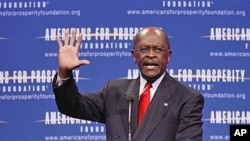While Republican party presidential hopeful Herman Cain continues to dismiss accusations of sexual harassment in his past, his uncertain political plight has become a main focus of American media. Advocates say the issue is very important and also goes beyond just politics.
Herman Cain is the latest in a long line of prominent U.S. politicians to face repeated accusations of sexual harassment.
At least three women have accused the former pizza magnate of sexual harassment during the 1990s when he was the top lobbyist for the National Restaurant Association.
Former Democratic U.S. President and Arkansas governor Bill Clinton was for years the focus of a sexual harassment lawsuit by former Arkansas state employee Paula Jones.
Former Florida Republican Congressman Mark Foley resigned in 2006 after it was disclosed he was sending sexually explicit emails and text messages to teenage interns.
At the National Women’s Law Center in Washington, Fatima Goss Graves says it is very important for voters to get clear records on politicians and any sexual harassment.
She says the issue also goes much further. “I am interested in knowing what the reaction is to harassment, what employees are saying that they think they should be doing about harassment, what policy makers are saying they should do about it. I do not think that that is where the conversation has been unfortunately,” said Graves.
Graves points to the hearings 20 years ago involving then Supreme Court nominee, now Justice, Clarence Thomas who faced accusations of sexual harassment in the workplace from Anita Hill.
The hearings were immediately followed by nearly double the amount of usual sexual harassment charges and new laws against workplace discrimination.
But advocates say these laws do not go far enough. Lisa Maatz from the American Association of University Women also says in difficult economic times, like now, victims are often afraid to come forward.
“Right now, quite frankly, a lot of women are just happy to have jobs and so the notion that they would then speak up and potentially lose that job even though such retaliation is illegal, it happens all the time, is a huge deal,” said Maatz.
Her association also just finished a new report detailing sexual harassment and bullying in U.S. schools which Maatz says has become an “epidemic”. The association is calling for education against harassment to begin at a very young age.
On the specific issue of Cain, the advocates say they hope his accusers, if they are identified, will not face what they call an onslaught of negative coverage by the media as has been the case in previous high-profile sexual harassment cases.
Cain has repeatedly denied the accusations against him. Recent polls still place him near the top of the Republican field of presidential hopefuls, two months before the Republican nominating process for the 2012 U.S. presidential election begins.




